Reportage

Photo: UNB
In a fairly dramatic development, the Jatiya Party, one of the three parties apart from the Awami League and BNP to have held power in Bangladesh (democratically or otherwise) announced that it will be joining the upcoming 12th parliamentary election as it has received 'assurance' from different 'stakeholders' that the polls will be free and fair. JP Secretary General Mujibul Haque Chunnu made the announcement at a press conference at party chairman GM Quader's Banani office.
It was all the more dramatic coming just two days after a delegation of JP leaders, loyal to party Chief Patron Raushan Ershad, in a meeting with Home Minister Asaduzzaman Khan raised concerns that their participation in the polls remained uncertain as GM Quader was yet to make the final decision in this regard.
Chunnu himself, just a day earlier, had given no indication of a decision being close in this regard.
Chunnu on Wednesday (Nov. 22) said the party has completed almost all preparations for the January 7 parliamentary polls.
"We have always said that we want an environment of trust which would enable voters to go to the polling stations and cast their ballots freely. We have been assured by all the stakeholders concerned, including the Election Commission, that the polls will be free, fair, and acceptable, and the voters will be able to exercise their franchise freely," he said.
Chunnu said the JP chairman trusted the assurance and decided to run in the election. But he refused to be drawn on who these stakeholders were.
"On the instructions of the party chairman, I am officially announcing that Jatiya Party will participate in the election."
Responding to a question, the JP secretary general said the party will not join any electoral alliance, and that it will field candidates in all 300 constituencies.
"We will not go for seat-sharing with any other party. We hope that we will be able to put up a strong contest in all 300 constituencies," Chunnu said.
Meanwhile, the JP has sold a total of 1,510 nomination forms over the last three days. The party started selling nomination papers on Monday.
The party earned Tk 4.53 crore from the sales of nomination forms at Tk 30,000 each, Mahmud Alam, joint office secretary of JP. Opposition leader Raushan, her son Rahgir Almahe Ershad and other JP leaders loyal to Raushan were yet to collect nomination papers, said party sources.
Earlier in the morning, Bangladesh Kalyan Party chairman Syed Muhammad Ibrahim launched the new political alliance Jukta Front with two other political parties and announced to join the next general election.
Syed Ibrahim, also the Front chief, made the announcement at a press conference at the National Press Club in Dhaka on Wednesday morning. He said that they would participate in the 12th parliamentary elections in alliance in a bid to make the 2024 elections credible to the nation and the world.
"I hope the election will be fair and acceptable," he said.
The international dimension
There are various unconfirmed allegations of coercion having been used to sway both GM Quader and Syed Ibrahim. The decision by Jatiya Party, assumes special significance as it was one of three parties that received a letter from US Assistant Secretary of State Donald Lu urging dialogue between the political parties to prepare the grounds for an acceptable election.
Meanwhile, it was announced that two US bodies, the International Republican Institute (IRI) and the National Democratic Institute (NDI), will deploy a joint team to Bangladesh to conduct a limited technical assessment of electoral violence conditions before, during, and after the country's January 7, 2024 parliamentary elections. The team will include five long-term analysts who will stay in Bangladesh for six to eight weeks, according to a press release of NDI issued yesterday.
This deployment follows a joint pre-election assessment mission (PEAM) that IRI and NDI conducted from October 8 to 11, 2023. The observations from the PEAM informed the structure and scope of the technical assessment, which will be conducted in accordance with the laws of Bangladesh and consistent with the Declaration of Principles for International Election Observation, which was endorsed in 2005 at the United Nations.
The technical assessment will include a thematic analysis of different types of election violence, including inter and intra-party violence, violence targeting women and other marginalised groups, and online harassment and threats, as well as the role of state institutions in addressing these types of violence.
The assessment will seek to evaluate the drivers and implications of election violence during the election cycle and provide constructive recommendations to reduce violence in future elections. Following the conclusion of the electoral process NDI and IRI will produce a technical assessment report on electoral violence.
NDI and IRI are nonpartisan, nongovernmental organisations that support and strengthen democratic institutions and practices worldwide. The institutes have collectively observed more than 200 elections in more than 50 countries over the last 30 years.
While NDI and IRI are independent organisation, the heightened interest shown by the US government itself in Bangladesh's upcoming elections came in for some pointed criticism this week, as Russia accused Peter Haas, the US ambassador in Dhaka, of discussing plans for organising antigovernment rallies with an opposition leader in Bangladesh in an "open disregard" for the Vienna Convention.
Haas met the opposition leader at the end of October, Russian foreign ministry spokesperson Maria Zakharova said in a briefing on Wednesday. The ministry has posted her remarks on X.
She said Russia has "already repeatedly highlighted the attempts of the United States and its allies to influence internal political processes in Bangladesh under the guise of ensuring that the upcoming parliamentary elections in the country are transparent and inclusive".
"How can these actions of the American Ambassador to Bangladesh be assessed? Nothing less than gross interference in the internal affairs of a sovereign state on the part of Washington and its satellites, demonstrating open disregard for the norms and rules enshrined in the Vienna Convention on Diplomatic Relations of 1961," Zakharova said.
She also said Russia does not "doubt the ability" of the Bangladeshi authorities to hold parliamentary elections scheduled for Jan 7 "in full compliance with national legislation independently without the help of overseas well-wishers".
The opposition BNP and the Jamaat-e-Islami have staged several rounds of transport blockade and hartal, or shutdown, after deadly clashes with police during their rallies on Oct 28. Presumably the reference by Zakharova is to the clashes on that day, and meetings between Haas and opposition figures leading up to the day's events. However, it is well known that US embassy officials have been meeting with opposition politicians quite regularly throughout this year. It is also well known that some of these meetings took place in October, prior to the Oct. 28 meeting, when Haas met the home minister as well. Although Ambassador Haas is out-of-station at the moment, even this week a BNP leader, Barrister Rumeen Farhana, met with officials from the US embassy at a city hotel.
Is the BNP for turning?
The holy grail for the Election Commission remains the participation of the only other party that can actually challenge the ruling Awami League, and that is the BNP. They have consistently refused to participate in the election under the incumbents. This week, on a number of occasions, the Election Commission sounded out that it may consider deferring the date of the national elections if "one party" decides to participate in the polls. Election Commissioner Anisur Rahman said as much, however, he did not name the party.
BNP, along with other like-minded allies are on the street demanding polls under a non-partisan caretaker government. Soon after the EC announced the polls schedule on November 15, BNP and its allies rejected it, and called for nationwide hartals and blockades.
"If they [one particular party] decide to participate, we will consider. We have the scope to defer the schedule as we have sufficient time. But we are yet to get any request in this regard," Anisur Rahman told reporters at the Sylhet District Administration conference hall after a meeting with Sylhet and Sunamganj administration and election officials.
"National polls in the past were never participated by 100 percent of the registered political parties. If a majority of the parties join the polls, there will be an election atmosphere," Anisur said.
Although there is a political movement centring the polls and sporadic incidents are happening, the situation is not yet threatening to the polls, he also said.
Meanwhile, Election Commissioner Brig Gen (retd) Ahsan Habib Khan echoed him saying that they are yet to take any decision regarding deferring the polls date. The commission's foremost aim is to hold a free and fair election, he said.
"We are sincere in our effort to hold participatory and acceptable national polls. We don't want to be debatable by holding a controversial one," he told journalists yesterday at the Jhenaidah DC office conference hall after meeting with Kushtia, Magura, Chuadanga, Meherpur and Jhenaidah district administration and election officials.
Rashida Sultana, another election commissioner, refused to make any comment on whether the EC would defer election if BNP decides to participate. Stressing that the election would be peaceful and credible, she said any attempts to obstruct voters from reaching polling centres would be dealt with according to the law.
The EC faces no pressure from the international community or domestically, she told reporters after meeting with administration and election officials of Dinajpur, Thakurgaon, Nilphamari, and Panchagarh districts at Dinajpur DC office.
The BNP however remains steadfast in its decision to not join the poils, even as its leadership remains mostly locked up in jail, or in hiding to avoid arrest. A Dhaka court this week rejected the bail petition of the party's secretary general Mirza Fakhrul Islam Alamgir, in a case filed over the vandalism of the chief justice's residence during the BNP-police clash on October 28.
Speaking through a virtual briefing, Ruhul Kabir Rizvi, the party's senior joint secretary, announced a fresh 48-hour countrywide blockade from Sunday, November 26 - the seventh spell of such programmes.
The harm to the economy
In an interview with our sister newsagency UNB, former governor of Bangladesh Bank Dr. Atiur Rahman explained how the current spate of blockades and burning of vehicles are taking a toll on the economy and suggested ways for reaching a solution.
Dr Atiur, currently emeritus professor at the Department of Development Studies in Dhaka University, said the fear of fire being set to the vehicles is real.
The protests have been called by BNP, Jamaat and some smaller allies, to protest the announcement of the schedule for the 12th parliamentary elections without taking their demands into consideration. The opposition demands that Prime Minister Sheikh Hasina steps down and hand over power to a neutral administration to make the vote free and fair. The government has rejected the demand as unconstitutional.
The economist said because of the protests the cost of transporting items for both domestic consumption and exports has gone up.
Also, most of the drivers and helpers have lost jobs as the vehicles aren't plying on the roads. These are mainly temporary jobs and thousands have been badly affected by this continuous political unrest, he said this week.
Dr Atiur said the ongoing unrest has not only been disrupting the domestic supply chains but also impacting the international supply chains as the inter-district truckers and container vehicles cannot move on the streets. While the agricultural producers are not getting the prices of their products due to this transport disruption the urban consumers of the same are being forced to pay higher prices, he pointed out.
The unrest with threats of torching and attacks on the vehicles and shops has already created a situation where business confidence is gradually shrinking. This is having a huge impact on the levels of investment, according to Dr Atiur.
The banks are also worried about the likely defaults of their loans as businesses are facing huge challenges. As the NBR chair has rightly pointed out, this political unrest along with the slowdown of imports will have a significant impact on the collection of revenues, he pointed out.
This again has an impact on the budget deficit and subsequent need for higher public borrowing. The inflation situation may worsen in such a complex situation. The country faced a similar crisis in 2014 and it was quite difficult for the regulators and government to pull back the economy on track following the political unrest.
"We managed to come out of this culture of burning ...subsequently leading to robust economic growth. However, the country is facing a negative culture of burning its assets after a long time. I hope good sense will prevail among all the stakeholders to avoid another round of political uncertainty and unrest leading to undesired loss of the economy," Dr Atiur said.
The foreign exchange crisis is likely to be prolonged if the political unrest continues like this. Both imports and exports are getting the hits from supply-side disruptions and cancellations of orders from the buyers, he observed.
"Also, the foreign direct investment is likely to be negatively affected if this political stalemate continues for a longer time. All these have both direct and indirect implications for the balance of payments which is already under severe pressure," he said.
The first best solution will be to get all the political parties onboard the election train at any cost. If needed, the Election Commission may be more flexible in its schedule to attract more parties into the election process, he said.
Even if some parties still avoid the election train even after such adjustments, let it move on with the candidates from contesting parties and individuals who are participating as independents.
In the meantime, "we must continue to move further towards market-determined solutions in making both exchange rates and interest rates flexible to bring back our macroeconomic stability."
Simultaneously, the central bank should try to attract more medium-term foreign exchange loans or deposits from friendly central banks of the region to bolster reserves.
Apart from this, the central bank must make its best efforts to attract more remittances through official channels by providing some more incentives to the small remitters and providing higher returns to fix dominated NRB bonds for the large remitters, said Dr. Atiur.









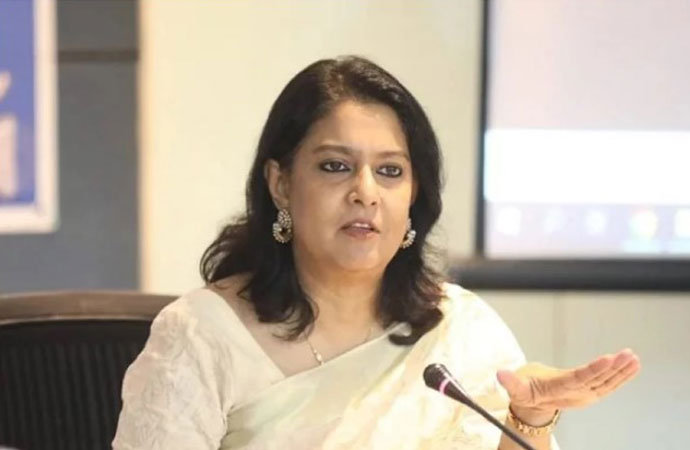
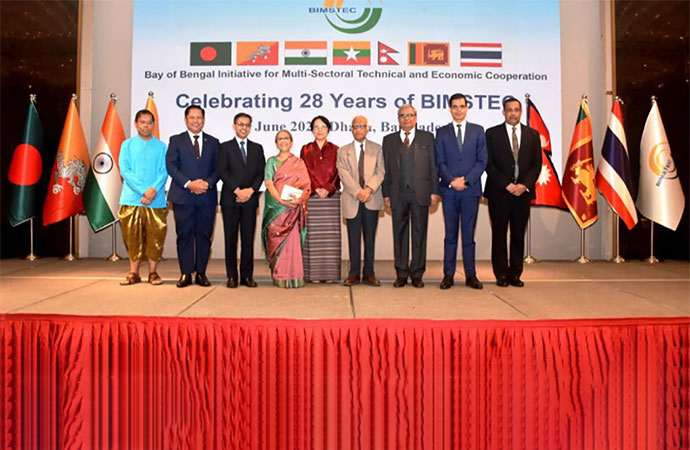








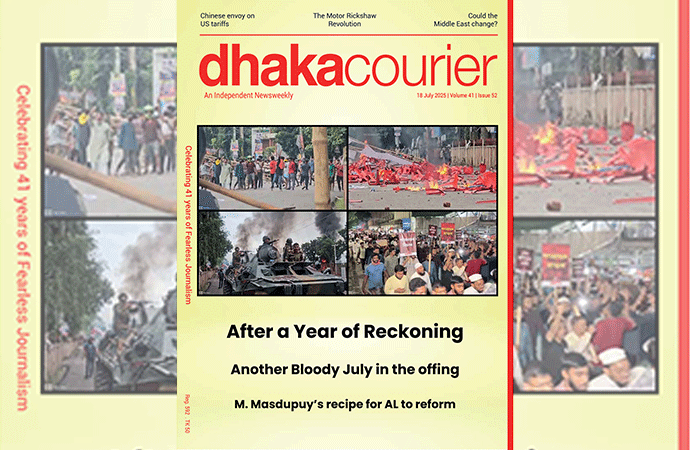
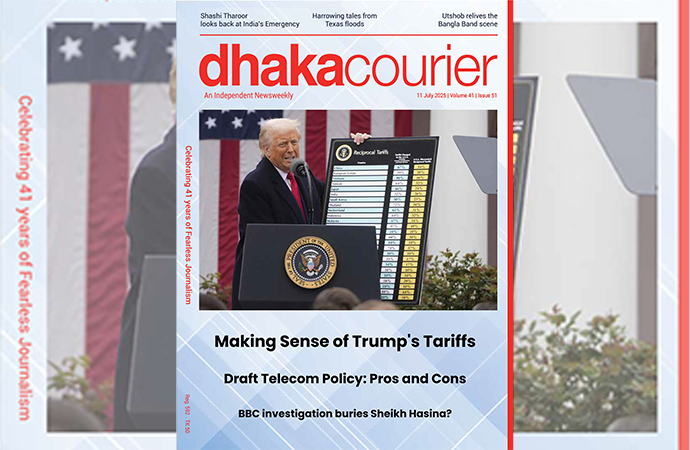
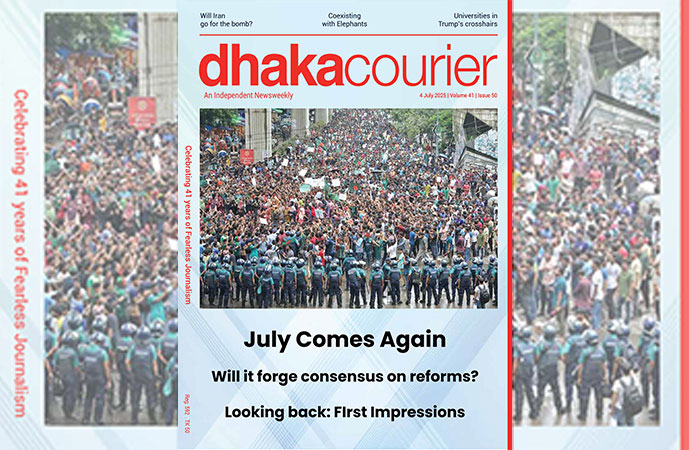
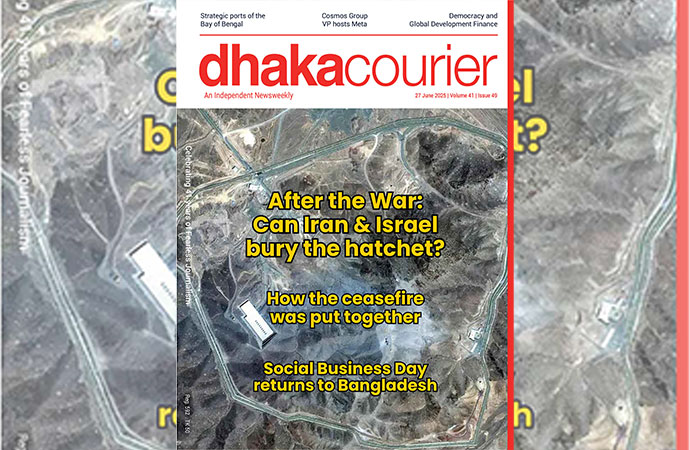
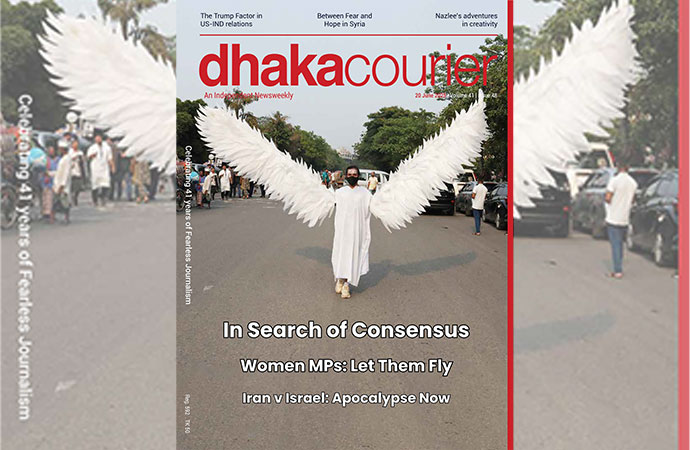
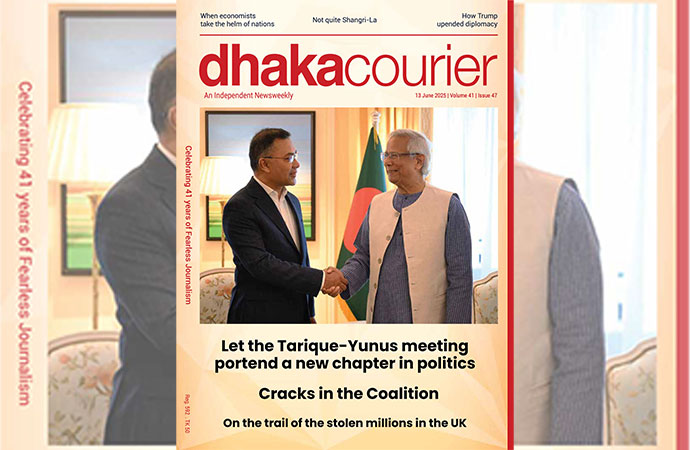
Leave a Comment
Recent Posts
The Northeastern Question
When secessionist movements sprang up across the Eastern European part ...
Trump’s Tariff: How far should ...
Will Bangladesh manage to get a last minute reprieve on its 'Trump tar ...
Rivers, Peaks, and Expressions – My Experience at th ..
What lies behind the alarming spike in violence agai ..
A Himalayan choice
Twenty Palestinians were killed at a food distributi ..